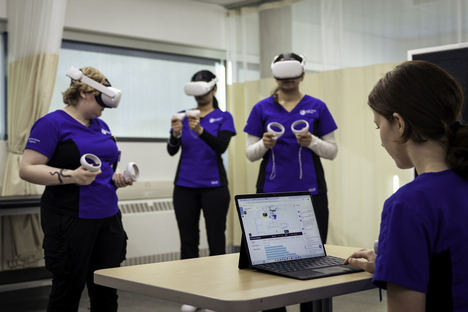UbiSim Immersive VR to Enhance Psychological Safety in Simulation

Table of Contents
Name of the heading 1
1- Start your table with the syntax {start-table}
2 - Add an H3 Heading to create a new column (this will be the column title)
3 - List cells as bullet points in a List element
4 - End your table with the syntax {end-table}
In simulation-based nursing education, psychological safety must be a priority, creating an environment where learners engage with high-stakes, realistic scenarios, such as managing a pediatric sepsis case or responding to a pregnant patient with preeclampsia, without fear of judgment.
Yet, traditional simulation often falls short. Research shows that 90% of nursing graduates have had negative experiences with traditional simulation, with 75% feeling uncomfortable being observed and critiqued on video (1).
This is where UbiSim helps transform the learning experience.
The UbiSim Difference
UbiSim addresses these concerns by providing a psychologically safe learning environment that aligns with best practices identified in clinical research. Our platform enables:
- Collaborative Learning Without Judgment: Up to 8 participants can join the headset experience simultaneously - with up to 3 as active participants and the rest as "ghost observers" - while larger groups can participate via casting to a large screen. This synchronous participation can provide a more supportive, evidence-based "guided simulation" approach proven to reduce anxiety and enhance learning outcomes (1).
- Flexible Participation Options: Students can practice in the same physical location or join remotely, with peers and instructors able to observe and offer input without the intimidation of traditional video observation (2).
- Build confidence: Learners build confidence gradually in a supportive environment that emphasizes learning over evaluation (2).
- Evidence-Based Design: Research shows that psychologically safe simulation experiences lead to significantly better learning outcomes and higher retention rates—97% compared to the industry average of 82.5%¹. UbiSim fosters this psychological safety through collaborative learning, removing the fear of being “on stage,” and offering immediate, supportive feedback. By incorporating collaborative observation methods, UbiSim helps transform simulation from a source of anxiety into a powerful, confidence-building experience. In fact, these methods contributed to simulation becoming the highest-rated component of a nurse residency program—earning a 5.9 out of 6 (1).
Transform your nursing simulation program to an experience that nurse learners rate as a highlight of their education.
By eliminating the fear and anxiety of traditional simulation, UbiSim helps nursing programs increase learner confidence, improve skill retention, and ultimately prepare more capable and confident nurses.
Citations:
(1) Kutzin, J. M., & Collins, L. (2025). Return on investment of incorporating simulation into a new graduate nurse emergency department residency program. Nursing Administration Quarterly, 49(1), 27-34. https://doi.org/10.1097/NAQ.0000000000000660
(2) Kardong-Edgren, S., Wells-Beede, E., & Wands, L. (2024). Student abuse in simulation: causes and solutions. Teaching and Learning in Nursing, 19(2), 145-149. https://doi.org/10.1016/j.teln.2024.02.007.
FAQs
Heading 1
Heading 2
Heading 3
Heading 4
Heading 5
Heading 6
Lorem ipsum dolor sit amet, consectetur adipiscing elit, sed do eiusmod tempor incididunt ut labore et dolore magna aliqua. Ut enim ad minim veniam, quis nostrud exercitation ullamco laboris nisi ut aliquip ex ea commodo consequat. Duis aute irure dolor in reprehenderit in voluptate velit esse cillum dolore eu fugiat nulla pariatur.
Block quote
Ordered list
- Item 1
- Item 2
- Item 3
Unordered list
- Item A
- Item B
- Item C
Bold text
Emphasis
Superscript
Subscript
Explore more

Why Academic-Practice Partnerships are the Future of Nursing
Learn how VR-enhanced Academic-Practice Partnerships eliminate transition shock, achieve 100% retention, and save health systems millions in turnover costs.

Beyond Pass Rates: Why Clinical Judgment Is the Measure of Nursing Readiness
Discover why clinical judgment, not just pass rates, indicates nursing workforce readiness. Learn how AI-enhanced VR simulation builds practice-ready graduates.

Why Q1 Decisions Determine Your Nursing Workforce Pipeline
Why January–March decisions shape nursing workforce capacity, readiness, and retention, and how early action strengthens the pipeline.


